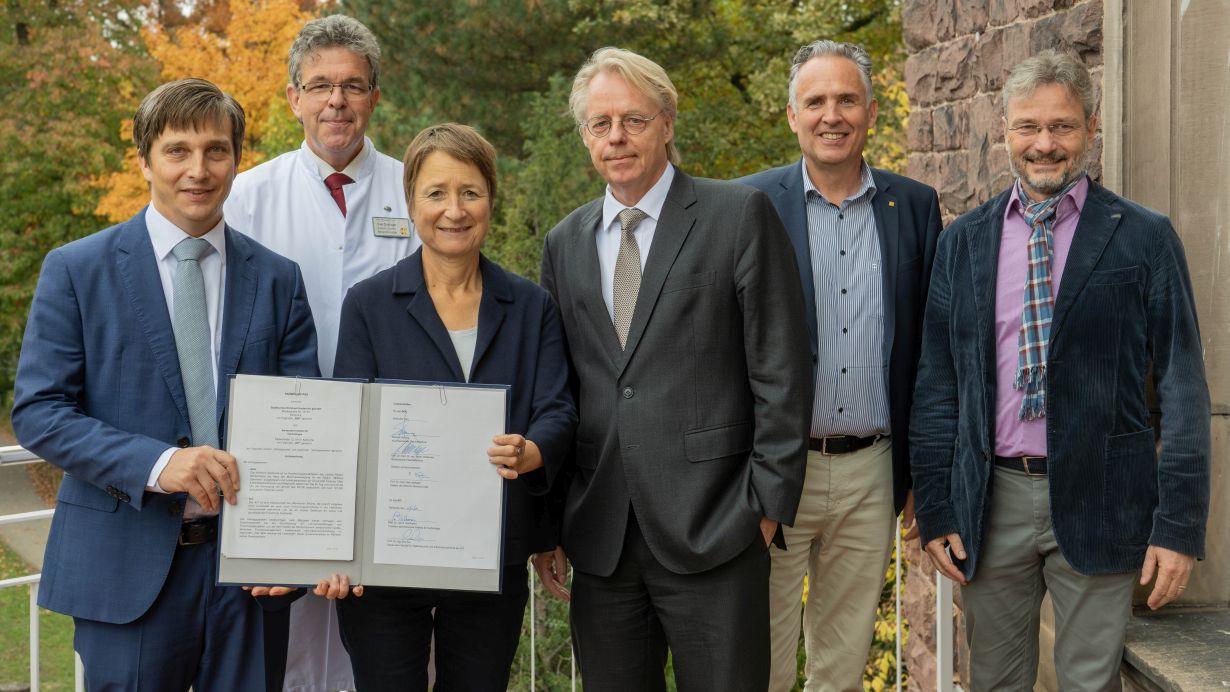
Karlsruhe Institute of Technology (KIT) and Städtisches Klinikum Karlsruhe will intensify their cooperation: The two institutions have concluded a cooperation agreement with the aim to link university research and clinical expertise even more closely. This will benefit both hospital patients and KIT students and researchers.
The cooperation will include joint research projects and courses in medical engineering, biomedical engineering, clinical process management, and medical information processing. The direct exchange with the different departments at SKK (short for Städtisches Klinikum Karlsruhe, Karlsruhe municipal hospital) enables the students to understand complex medical and process-related challenges and use these insights when developing innovative solutions.
"With this cooperation, we are sending a strong signal for strengthening Karlsruhe as a healthcare and sciences hub. The combination of teaching, research, and clinical practice creates synergies that benefit not only the hospital and KIT, but the entire region," says Bettina Lisbach, Mayor for Environment and Health of the City of Karlsruhe and Chairwoman of the hospital's Supervisory Board.
KIT also considers this cooperation a benefit, in particular for society. The combination of technical expertise and practical application is targeted at a further improvement of medical care in the Karlsruhe region. "Therefore, it is really a must for SKK and KIT to pool their skills right now," emphasizes Professor Dr. Jan S. Hesthaven, President of KIT. "Digitalization and the use of artificial intelligence offer unprecedented possibilities that we can only exploit by acting together."
"By using state-of-the-art technology in a responsible way, we are helping people - from prevention and care to applications in the operating room and for live-saving emergency response," adds Professor Eric Sax, Dean of the KIT Department of Electrical Engineering and Information Technology. "The cooperation with SKK helps us to face this challenge."
Scientific Progress for More Cutting-edge Medicine
For the hospital, this cooperation represents an essential step towards integrating innovation into patient care faster and actively contributing to the medical-technical progress. "The close cooperation with KIT is a crucial element for the future of cutting-edge medicine in Karlsruhe. The combination of the excellent research and teaching done at KIT with our clinical expertise creates an optimal environment in which innovation will quickly find its way to our patients. At the same time, we can offer highly qualified young talents hands-on training and upskilling using state-of-the-art technologies," says Professor Martin Holderried, Medical Managing Director at SKK.
"Medical engineering is a growing and future-oriented sector, especially in neurosurgery. For our patients, this means even better medical diagnostics and innovative therapeutic options in the long term - we are linking cutting-edge research with state-of-the-art clinical application," says Professor Uwe Spetzger, Director of the Neurosurgical Clinic at SKK.
detailed caption: KIT and SKK sign a cooperation agreement to strengthen their cooperation: (from left to right) Professor Martin Holderried, SKK Medical Managing Director; Professor Uwe Spetzger,Director of the Neurosurgical Clinic at SKK; Bettina Lisbach, Mayor for Environment and Health of the City of Karlsruhe and Chairwoman of the SKK Supervisory Board; Professor Jan S. Hesthaven, President of KIT; Markus Heming, SKK Commercial Manager; Professor Eric Sax, Dean of the KIT Department of Electrical Engineering and Information Technology (photo: Markus Kümmerle / SKK)
Being "The University in the Helmholtz Association", KIT creates and imparts knowledge for the society and the environment. It is the objective to make significant contributions to the global challenges in the fields of energy, mobility, and information. For this, about 10,000 employees cooperate in a broad range of disciplines in natural sciences, engineering sciences, economics, and the humanities and social sciences. KIT prepares its 22,800 students for responsible tasks in society, industry, and science by offering research-based study programs. Innovation efforts at KIT build a bridge between important scientific findings and their application for the benefit of society, economic prosperity, and the preservation of our natural basis of life. KIT is one of the German universities of excellence.






